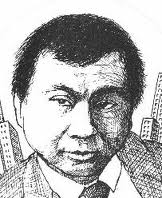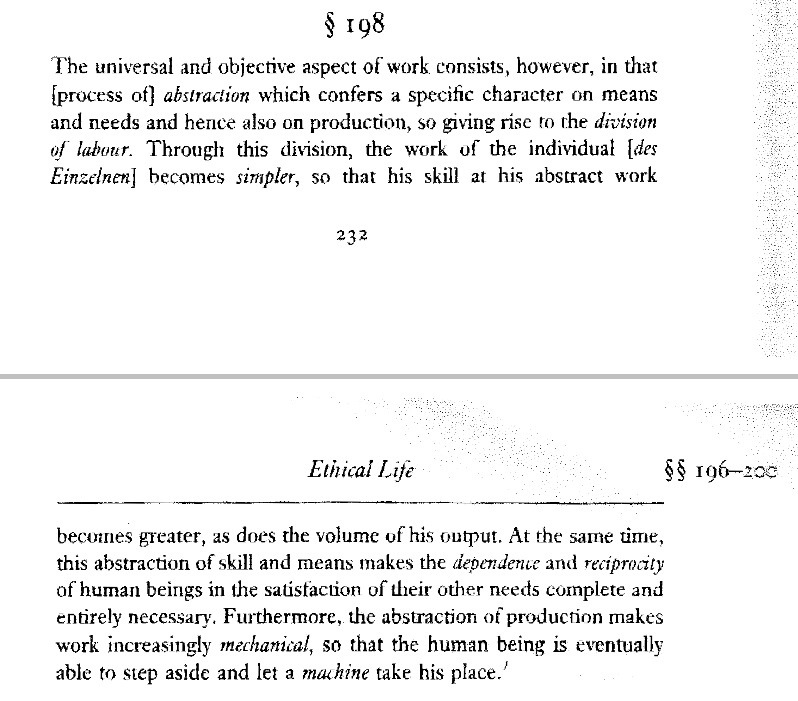 GWF Hegel was among the first thinkers to call attention to a phenomenon that social scientists call “convergence.” Convergence differs in significant ways from social Darwinism, which held to something like the survival of the socially most fit, insofar as instead of viewing communities in competition for survival with one another, convergence postulates a logical totality towards which all communities are moving. This logic can be composed ideally, but it might also be composed pragmatically in an iterative process. What is essential in convergence is that we view the world system as a potential, integrated totality.
GWF Hegel was among the first thinkers to call attention to a phenomenon that social scientists call “convergence.” Convergence differs in significant ways from social Darwinism, which held to something like the survival of the socially most fit, insofar as instead of viewing communities in competition for survival with one another, convergence postulates a logical totality towards which all communities are moving. This logic can be composed ideally, but it might also be composed pragmatically in an iterative process. What is essential in convergence is that we view the world system as a potential, integrated totality.
 From this vantage point, not only are F Fukuyama and GWF Hegel convergence theorists, but so too are J Moltmann and W Pannenberg, as is the Chicago economist R Lucas Jr.
From this vantage point, not only are F Fukuyama and GWF Hegel convergence theorists, but so too are J Moltmann and W Pannenberg, as is the Chicago economist R Lucas Jr.
In the problematic we have been developing since last September, both social Darwinism and more conventional convergence theory can be explained by appealing to the actual material integration of social action within the capitalist social formation. Indeed, even traditional Marxism only holds validity to the extent that social action is increasingly integrated and defined by abstract labor time expended.
What I like about F Fukuyama is that he explicitly celebrates many of the features of this comprehensive integration downplayed by circumspect theorists. Thus, for example, where other theorists might downplay the violent, homicidal dimension of this integration, F Fukuyama foregrounds this side of global capitalism. Similarly, whereas many theorists would be inclined to celebrate what they mistake for the democratic and rights-based dimension of global capitalism, F Fukuyama instead calls attention to the flaws in the French-British-American Hobbesian resolution of the problem of freedom. Real capitalism, according to F Fukuyama, resolves the problem of freedom in favor of the Master who, because he would rather die than be anyone’s slave, enjoys true freedom. The French-British-American resolution of the problem, by contrast, makes slaves of all.
This foregrounding of freedom appears on its surface to liberate GWF Hegel from the Left, where he was doomed to oblivion, and repatriate him to the Right, where he will enjoy a second birth. And, as a matter of fact, F Fukuyama shows us where GWF Hegel ends when he is not redeemed through a radically immanent historical critique.
This is because, absent a radically immanent historical critique, GWF Hegel becomes a spokesman not for the substantial freedom that might have become his hallmark, but for the very kind of empty Kantian freedom that he otherwise found so completely noxious. This is not to take anything from A Kojève’s brilliant recuperation of the Slave-Master relationship, or from F Fukuyama’s tantalizing seating of Mssrs. Kojève and Strauss next to one another in the orchestra. (How completely salacious.) Which may help to explain why K Marx grew so utterly bored with the Phenomenologie des Geistes and was so eager to advance to the much more mature and fully developed Philosophie des Rechts. For it is here, finally, that GWF Hegel wrestles quite seriously with the material problem of freedom.
What if the future does not entail convergence? What if instead it entails divergence (not the movie, but the much more brilliant series of books)? What if freedom is not won through death and dying, but through embodiment and — as a better Hegel might have preferred — through particularity? What if we are better and more fully ourselves, not when we struggle for domination, but when we attend to the brilliant variety of paths that lead us to cross one another’s paths?
Another interpretation of K Marx has him celebrating not totality, but diversity and divergence. We need to listen to how closely F Fukuyama follows the script of an older, more traditional Marx (and Hegel), and how he therefore stumbles into the trap laid there for all of those who long for some kind of final solution, a neat and tidy, rational and logical, end to history.

 GWF Hegel was among the first thinkers to call attention to a phenomenon that social scientists call “convergence.” Convergence differs in significant ways from social Darwinism, which held to something like the survival of the socially most fit, insofar as instead of viewing communities in competition for survival with one another, convergence postulates a logical totality towards which all communities are moving. This logic can be composed ideally, but it might also be composed pragmatically in an iterative process. What is essential in convergence is that we view the world system as a potential, integrated totality.
GWF Hegel was among the first thinkers to call attention to a phenomenon that social scientists call “convergence.” Convergence differs in significant ways from social Darwinism, which held to something like the survival of the socially most fit, insofar as instead of viewing communities in competition for survival with one another, convergence postulates a logical totality towards which all communities are moving. This logic can be composed ideally, but it might also be composed pragmatically in an iterative process. What is essential in convergence is that we view the world system as a potential, integrated totality. From this vantage point, not only are F Fukuyama and GWF Hegel convergence theorists, but so too are J Moltmann and W Pannenberg, as is the Chicago economist R Lucas Jr.
From this vantage point, not only are F Fukuyama and GWF Hegel convergence theorists, but so too are J Moltmann and W Pannenberg, as is the Chicago economist R Lucas Jr. As everyone knows who has spent any length of time living out of country, there are, as Pierre Bourdieu might put it, many habits, rhythms, and “structures” that “go without saying” when you are within your habitus, but which, when you are out of country, loom large. Perhaps not surprisingly, since we are material beings, meals and meal time habits form a large part of those things that “go without saying.” Euro-Americans are likely to already feel somewhat alienated by a British or French or German breakfast. I know I do. But then as we move east, that feeling grows. In Bosnia and Herzegovina, for example, it is almost impossible to find a cafe that serves both coffee and a pastry. It is difficult to find a cafe that serves both coffee and Burek, the customary meat-filled pastry consumed by Bosnians and Herzegovinians between 9 am and 11 am. And it is impossible to find Bacon and Waffles; or Bacon and Maple Syrup. This is not because Muslims make up roughly eighty percent of the population; there are, after all, roughly 10 percent each of Catholics and Orthodox. And there are plenty of pork butchers; 3 within 5 minutes walking from our home. Rather do I think that it is a matter of habitus; but, what is that?
As everyone knows who has spent any length of time living out of country, there are, as Pierre Bourdieu might put it, many habits, rhythms, and “structures” that “go without saying” when you are within your habitus, but which, when you are out of country, loom large. Perhaps not surprisingly, since we are material beings, meals and meal time habits form a large part of those things that “go without saying.” Euro-Americans are likely to already feel somewhat alienated by a British or French or German breakfast. I know I do. But then as we move east, that feeling grows. In Bosnia and Herzegovina, for example, it is almost impossible to find a cafe that serves both coffee and a pastry. It is difficult to find a cafe that serves both coffee and Burek, the customary meat-filled pastry consumed by Bosnians and Herzegovinians between 9 am and 11 am. And it is impossible to find Bacon and Waffles; or Bacon and Maple Syrup. This is not because Muslims make up roughly eighty percent of the population; there are, after all, roughly 10 percent each of Catholics and Orthodox. And there are plenty of pork butchers; 3 within 5 minutes walking from our home. Rather do I think that it is a matter of habitus; but, what is that?